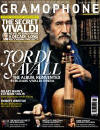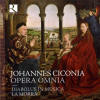Texte paru dans: / Appeared in:
*

GRAMOPHONE (12/2011)
Pour s'abonner /
Subscription information
Ricercar
RIC316

Code-barres / Barcode;
5400439003163
Reviewer: David Fallows
After a quarter-century’s wait, a new complete set of Ciconia
Ciconia has done very well in the recording studios and is easily the most-recorded composer active in the years around 1400. From the time of Alfred Deller’s unforgettable ‘O rosa bella’ (1953) and particularly the Studio der Frühen Musik’s Ciconia record of 1972, there is hardly an early music performer anywhere who has not faced up to the polyrhythmic challenges of ‘Sus un fontayne’ or the dizzying roulades of ‘Per quella strada’. So these and other favourites have been recorded many times. But as with any composer there are many works that are rarely heard, in Ciconia’s case particularly the Mass movements.
That is why Paul van Nevel recorded Ciconia’s complete known works with the Huelgas Ensemble back in 1982 (reissued on CD in 1998 — Pavane, nla) — a set that may have its unevennesses but also includes a fair number of scintillating performances. It made Ciconia the only substantial composer before Dowland to benefit from an intégrale. Now, benefiting from the 1985 critical edition of the music and a further quarter-century’s performances and investigations, we have a second recording.
This time the task has been divided: Antoine Guerber and Diabolus in Musica take on the sacred music and the motets; La Morra, directed by Corina Marti and Michal Gondko, present the songs. It works well. Diabolus in Musica go for a bright and light sound that contrasts very much with the heavier performances of Paul van Nevel. La Morra prefer a more ruminative and thoughtful approach to the songs that is again entirely different from what has been heard before — including what must be the slowest ever performance of ‘Per quella strada’. As with any complete recording, some tracks are better than others, but we do get a new and clearer aural picture of who Ciconia was.
The set comes with an essay on Ciconia by Philippe Vendrix, notes on the music by the respective directors and good translations of the texts, in some cases going beyond what is in the available literature. I must add that the producer Jérôme Lejeune dedicates it to his mother, Suzanne Clercx-Lejeune, whose research and whose infectious enthusiasm first put Ciconia seriously onto the map in the 1960s. It is a fitting tribute.
*
Cliquez l'un ou l'autre
bouton pour découvrir bien d'autres critiques de CD
Click either button for many other reviews


